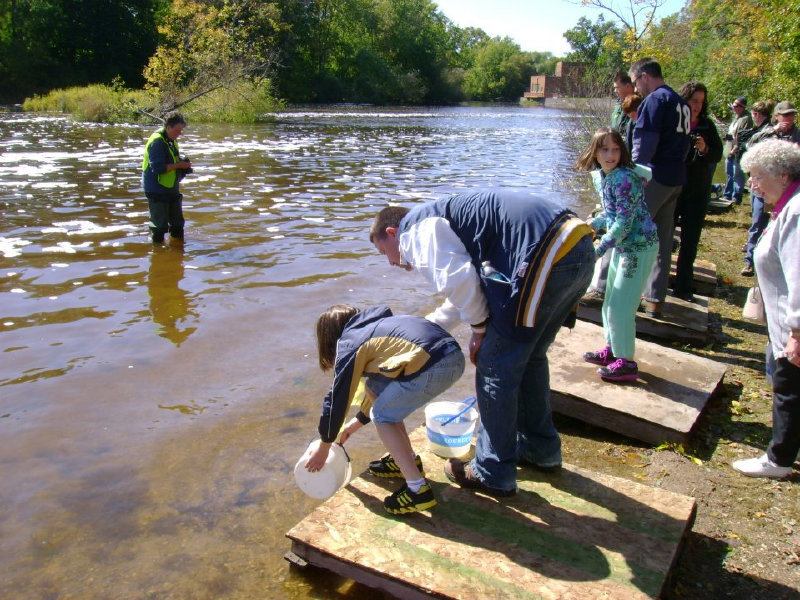This summer, two local organizations are banding together to show the Lake Michigan watershed a little much-needed TLC. Root-Pike WIN, a non-profit protecting the Root and Pike river watersheds, joined with Sweet Water (The Southeastern Wisconsin Watersheds Trust) last year to create the "Respect Our Waters" campaign to combat the most dangerous pollutant clean water faces today: a lack of public awareness.
In January 2010, Sweet Water’s executive director Jeff Martinka became alarmed by the results of a recent Public Policy Forum revealing that most people believed their actions had no consequences as far as water quality is concerned.
"What we found out ... is basically, the public didn’t know much about their role in nonpoint source pollution, the sort of pollution that runs off of yards, driveways (and) streets," he told OnMilwaukee.com. "And even worse, what we found is that they had a sense there was nothing they could do to try to improve water quality."
Eighty-five percent of respondents believed that individual actions had no effect on water quality.
Susan Greenfield, executive director of Root-Pike WIN, saw a similar trend in the results of a household survey conducted by her organization.
"People’s awareness level about the impact of stormwater runoff and what exactly it is, whether or not it gets treated, that there might be actions they could take that would reduce the pollution – there was not a lot of awareness," she said.
Determined to increase the public’s knowledge about its own powerful effect on our region’s water quality, the groups pooled their resources and launched "Respect Our Waters" last summer. This broad-based media and PR campaign incorporates advertising, community events and a pretty cute pitchman (or pitchpooch), Sparkles the Water Spaniel, who reminds us that "clean water is a matter of proper training."
Since its inception the campaign has released several popular TV spots (using the talents of Eichenbaum & Associates) featuring Sparkles.
"Their ads, especially the toilet ad, still make me laugh. They get attention," said Greenfield, referring to an ad where Sparkles drinks from the toilet and asks viewers, "Oh, you think this is disgusting? It’s nothing compared to what you’re doing to your own water outside!"
"Before (the runoff water) gets to the street, it picks up car chemicals, lawn fertilizer, pet waste, and then once it gets in the street it gets even worse," said Greenfield. "It’s a pretty nasty brew once it hits out waterways."
And that’s the water we all end up drinking from.
The Sparkles campaign will be presented at the ninth annual Healing Our Waters conference in Milwaukee, Sept. 10-12.
Throughout the summer months, Respect Our Waters will have a table at dozens of community events all over the Milwaukee area (see a full list of events here), educating the public, handing out information and pet waste bags and even giving away rain barrels.
"It might seem silly – what difference does it make if my car drips? What difference does it make if I don’t pick up after my dog once?" said Martinka. "What we’re trying to let people know is there is large cumulative impact of small individual action. The idea is if we can get the public engaged to do that series of small actions, there will be a cumulative impact on the Milwaukee River, the KK River, the Menomonee River and Lake Michigan."
He pointed out that one rain barrel holds only 55 gallons, but if 17,000 rain barrels were set up in the Milwaukee area it would save the watershed over 1 million gallons of runoff per year. Rain barrels are also ideal for watering flower gardens and lawns, lacking the chlorination of city water or mineral content of well water. They can also direct runoff away from the foundation of a house, if flooding is an issue.
Respect Our Waters has also funded over 100 rain gardens throughout the watershed. "They’re very effective at holding back water," said Greenfield. "You can replace some of your turf grass with...native plants, which have deep-rooted systems and are very effective at bringing water vapor into the ground. Stormwater trees, deep-rooted trees, are very good at managing stormwater. Evergreens are very good, and I think are even better because they can hold so much rainwater within their branches."
Other simple solutions include collecting your lawn clippings rather than raking them to the side of the road, as it often rains before the public works department can pick them up. It can be easily composted and used in a garden.
The campaign is funded in part by a grant from the Wisconsin Department of Natural Resources and works in collaboration with 29 area municipalities from the Illinois border to Washington County (West Milwaukee just recently came on board a few weeks ago). Root-Pike WIN and Sweet Water hope to continue the campaign for two more years, at which time they will conduct another survey to gauge improvement.
"Individuals can have an impact," said Martinka. "Small actions can have a large cumulative impact. I want people to have a sense of empowerment."
If you’re interested in learning more about responsibly managing urban runoff, visit the Respect Our Waters website.
Colleen Jurkiewicz is a Milwaukee native with a degree in English from the University of Wisconsin-Milwaukee, and she loves having a job where she learns something new about the Cream City every day. Her previous incarnations have included stints as a waitress, a barista, a writing tutor, a medical transcriptionist, a freelance journalist, and now this lovely gig at the best online magazine in Milwaukee.







